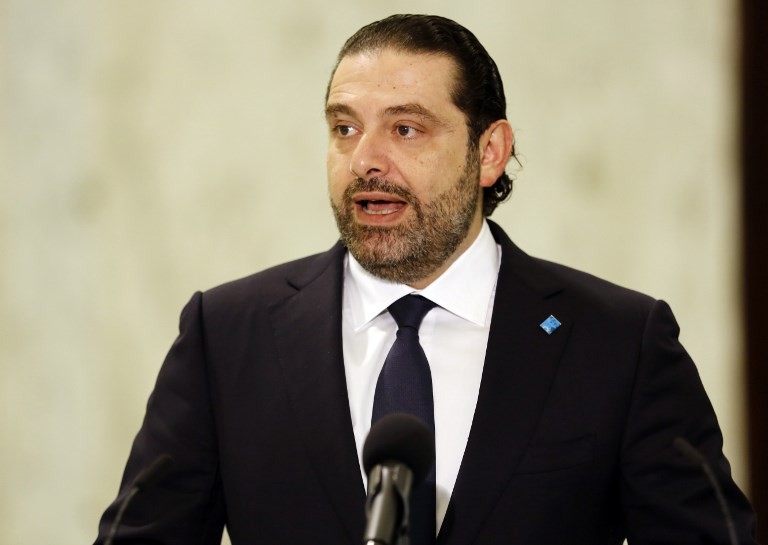Popular Reads
Top Results
Can't find what you're looking for?
View all search resultsPopular Reads
Top Results
Can't find what you're looking for?
View all search resultsIn Lebanon, prime minister exit raises spectre of fresh war
Change text size
Gift Premium Articles
to Anyone
 This file photo taken on November 03, 2016 shows Lebanon's new Prime Minister Saad Hariri speaking to journalists following his nomination at the presidential palace in Baabda, near Beirut. Hariri announced his suprise resignation on Nov. 4, 2017, in a televised speech. (Agence France -Presse/Anwar Amro)
This file photo taken on November 03, 2016 shows Lebanon's new Prime Minister Saad Hariri speaking to journalists following his nomination at the presidential palace in Baabda, near Beirut. Hariri announced his suprise resignation on Nov. 4, 2017, in a televised speech. (Agence France -Presse/Anwar Amro)
S
aad Hariri's resignation from Lebanon's premiership has raised fears that regional tensions were about to escalate and that the small country would once again pay a heavy price.
Analysts said the Saudi-backed Sunni politician's move on Saturday to step down from the helm less than a year after forming a government was more than just the latest hiccup in Lebanon's notoriously dysfunctional politics.
"It's a dangerous decision whose consequences will be heavier than what Lebanon can bear," Hilal Khashan, a professor of political science at the American University of Beirut, said.
Hariri announced his resignation in a broadcast from Saudi Arabia, accusing Iran and its Lebanese ally Hezbollah of taking over his country and destabilising the entire region.
Hezbollah is part of the government, but the clout of a group whose military arsenal outstrips that of Lebanon's own armed forces is far greater than its share of cabinet posts.
For years now, Lebanon has been deeply divided between a camp dominated by the Shiite Tehran-backed Hezbollah and a Saudi-supported movement led by Hariri.
"Hariri has started a cold war that could escalate into a civil war, bearing in mind that Hezbollah is unmatched in Lebanon on the military level," Khashan said.
The rift in Lebanon's political class led to the assassination in 2005 of Hariri's father Rafik, an immensely influential tycoon who made his fortune in Saudi Arabia.
Investigations pointed to the responsibility of Syrian President Bashar al-Assad's regime and its Lebanese ally Hezbollah.
Other political assassinations in the anti-Hezbollah camp ensued, then a month-long war between the powerful militia and neighboring Israel, as well as violent internal clashes that harked back to the dark days of the 1975-1990 civil war.
Twelve years on, Lebanese politics remain just as toxically sectarian and the threat of another flare-up very real. Hariri even said on Saturday he feared going the way of his father.
His resignation came in a context of high tension between Saudi Arabia, once the region's powerhouse, and Iran, which has played an increasingly predominant political and military role in the region recently.
On Friday, Hariri met Iran's most seasoned diplomat, Ali Akbar Velayati, before flying to Saudi Arabia and resigning from there via a Saudi-funded television network.
"The timing and venue of the resignation are surprising... but not the resignation itself," said Fadia Kiwane, political science professor at Beirut's Saint Joseph University.









